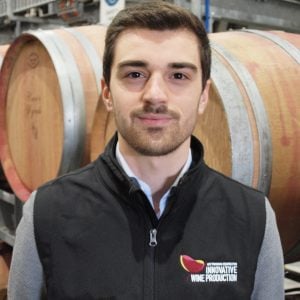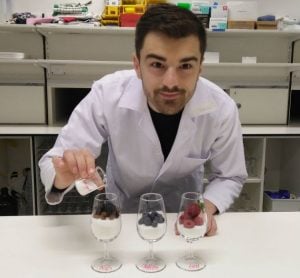Could you tell us a bit about yourself and your academic background?
 I come from a rural background, near Milan in Italy, so I have always been in touch with, interested and exposed to agriculture. My father was especially interested in wine and he passed this interest to me. I had a lot of trouble deciding a career pathway in high school. I felt this was something I could do and I was interested in it so I decided to try my hand at viticulture at university. I went to the University of Milan for my undergraduate degree, and once the specialised lectures and fieldtrips started, I really enjoyed learning about this area of research and it helped me develop a broad interest in the field. For my Bachelor Thesis, I did an assessment of the performance of varieties usually grown at high altitudes, after transplantation into a new environment of the mountains of Central Italy.
I come from a rural background, near Milan in Italy, so I have always been in touch with, interested and exposed to agriculture. My father was especially interested in wine and he passed this interest to me. I had a lot of trouble deciding a career pathway in high school. I felt this was something I could do and I was interested in it so I decided to try my hand at viticulture at university. I went to the University of Milan for my undergraduate degree, and once the specialised lectures and fieldtrips started, I really enjoyed learning about this area of research and it helped me develop a broad interest in the field. For my Bachelor Thesis, I did an assessment of the performance of varieties usually grown at high altitudes, after transplantation into a new environment of the mountains of Central Italy.
Once I graduated, I continued on to a Masters in Viticulture and Oenology at the University of Turin in Italy. For my Master’s thesis, I looked in to the feasibility of using portable proximal sensors for estimations of nutrients and pigments in grape vine canopies. I was especially interested in this area as it is a way of estimating these values in a non-destructive way. It also eliminates variability when compared to taking a new bunch of grapes each time for sampling, which introduces variability due to differences between bunches as well as being a destructive. Being able to track the changes over time of a single berry still remains my biggest dream!
I finished my double degree Masters ‘Vitis Vinum’ at Hochschule Geisenheim University in Germany, at which point I wanted to move out of Europe and experience more. During the intense period of my thesis, I was contacted by a Professor I became friends with during my Bachelor’s degree, who strongly suggested I apply for this PhD in Australia. I have always wanted to continue my academic career through a PhD, so I decided to take a chance and do it.
Could you introduce us to your project and what it involves?
 I am researching fruit quality, aiming to understand the nexus between sugar levels and flavour in berry ripening.
I am researching fruit quality, aiming to understand the nexus between sugar levels and flavour in berry ripening.
I am partnered with E & J Gallo Winery, which is based in California, USA. This is a large facility which does lots of research, that is then transformed in to production and practical use. As we are researching and working in two hemispheres, I will be able to collect double the data during my candidature (as you can collect data for 2 seasons per year) which is especially important as the project involves the growth of grapes in different conditions, and about half a year is necessary to get grapes from the vine.
So far, my project has been planned into three sections;
- The first is a concept study in physiology and it consists of experiments to understand the relationship between sugar and flavour in grapes throughout ripening. We will harvest berries at sequential dates and measure sugar and key aroma compounds to see if berries that possess similar sugar levels are clustered together with similar aroma profiles. Through this, we will be able to verify if sugar concentration relates to flavour concentration and it will help us get a basic understanding of how the two processes occur in ripening.
- The second investigates the real problem. We will study how grapes respond to new and changing environments, such as increased temperatures due to climate change, and focus on how the environment affects flavour and the mutual accumulation of sugar (which is known to be hastened by elevated temperature and consequent water stress).
- The final section will give a solution by addressing practical strategies that could be used to increase fruit quality in the current environment- such as thinning leaves to delay sugar increase in slow ripening grapes, which will result in grapes with lower sugar content of the desired aroma potential without decrease in the final yield while being economically viable.
What can you see yourself doing in the future?
Before I arrived in Australia, I wanted to make my experience and expertise larger through expanding my knowledge and meeting new people- to experience everything I can, and to grow as a person. Now, I want a ‘full-bodied’ experience, like a full-bodied wine – but always with harmonious balance!
At the moment, I am focused on the present. I have found that the lifestyle provided by working here at the Centre suits me as it is a combination of both industry work and research. It enables me to talk to researchers in many different areas and be exposed to new research. For the future, I am still deciding whether to pursue a more academic career with research- becoming a professor, then guiding students (as it also provides opportunities to experience new things), or if I want to work in the industry, such as in production. Whatever I decide to pursue though, through my time here I will have relevant experience in both research and industry.
